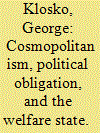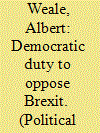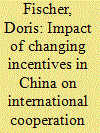| Srl | Item |
| 1 |
ID:
106418


|
|
|
|
|
| Publication |
2011.
|
| Summary/Abstract |
Current scholars generally view political obligations as "content independent." Citizens have moral reasons to obey the law because it is the law, rather than because of the content of different laws. However, this position is subject to criticism on both theoretical and practical grounds. The main consideration in favor of content independence, the so-called "self-image of the state," does not actually support it. Properly understood, the state's self-image is to comply with laws because of the underlying moral reasons that justify them, rather than because they are laws. Because content independence has played a central role in the widespread belief that a suitable theory of political obligation is not possible, rejecting it allows the possibility of a theory that establishes moral requirements for virtually all citizens to behave in accordance with virtually all laws, although these requirements are particular to different laws, and subjects are not required to obey them because they are laws.
|
|
|
|
|
|
|
|
|
|
|
|
|
|
|
|
| 2 |
ID:
087437


|
|
|
|
|
| Publication |
2009.
|
| Summary/Abstract |
While we generally take it for granted that governments should provide social welfare and other benefits to their citizens, justification of these services depends on special moral requirements people owe to their compatriots, as opposed to inhabitants of other countries, who may be far more needy. While widely discussed defenses of compatriot preferences can be seen to be flawed, the latter may be justified through a public goods argument. Security and other public goods are not only necessary for acceptable lives but are provided through the cooperative activity of compatriots, coordinated and enforced by the state. Because the necessary public goods require general cooperation throughout society, all individuals who are required to comply should have rights to participate in decisions about the form in which they are provided. Because these political rights must be substantive rather than merely formal, they justify requirements of distributive justice and so compatriot preferences.
|
|
|
|
|
|
|
|
|
|
|
|
|
|
|
|
| 3 |
ID:
153288


|
|
|
|
|
| Summary/Abstract |
What should be the position of democrats in response to the Brexit referendum? Many urge a duty to accept the result. This article argues the contrary. If someone is a UK citizen, has a belief that leaving the European Union will be damaging to the common good of the UK and is a convinced democrat, then that person has a duty to oppose Brexit. Neither of the two principal reasons for accepting the result—a claim of popular sovereignty or of parliamentary sovereignty—imply a duty not to continue to oppose. Arguments from political equality for simple majority rule do not apply when the alternatives are ill defined. More generally, popular sovereignty presupposes and does not replace constitutional democracy, and in a parliamentary democracy there is always a continuing right to oppose.
|
|
|
|
|
|
|
|
|
|
|
|
|
|
|
|
| 4 |
ID:
132729


|
|
|
|
|
| Publication |
2014.
|
| Summary/Abstract |
Over the past three decades, China's fast economic development has induced considerable changes in China's university and research institution landscape, research financing and academic career incentives. This paper argues that these changes have affected the motivation and the ways in which Chinese scholars engage in international research cooperation. Most recently it has been observed that strong pressures on scholars and scientists - especially at leading academic institutions - to excel in international publications while simultaneously fulfilling their obligation to generate income for their institutions can lead to a dilemma with regard to international research cooperation: Those institutions and scholars most interesting for foreign scholars to cooperate with may be the ones with the least amount of both incentive and time to enter into serious cooperation. This article invites us to reflect on the implications of these changes in the incentive structure for cooperation in social science research on China.
|
|
|
|
|
|
|
|
|
|
|
|
|
|
|
|
| 5 |
ID:
047077


|
|
|
|
|
| Publication |
Albany, State University of New York press, 1989.
|
| Description |
xiv, 179p.
|
| Standard Number |
0791400921
|
|
|
|
|
|
|
|
|
|
|
|
Copies: C:1/I:0,R:0,Q:0
Circulation
| Accession# | Call# | Current Location | Status | Policy | Location |
| 044420 | 323.65/DEL 044420 | Main | On Shelf | General | |
|
|
|
|